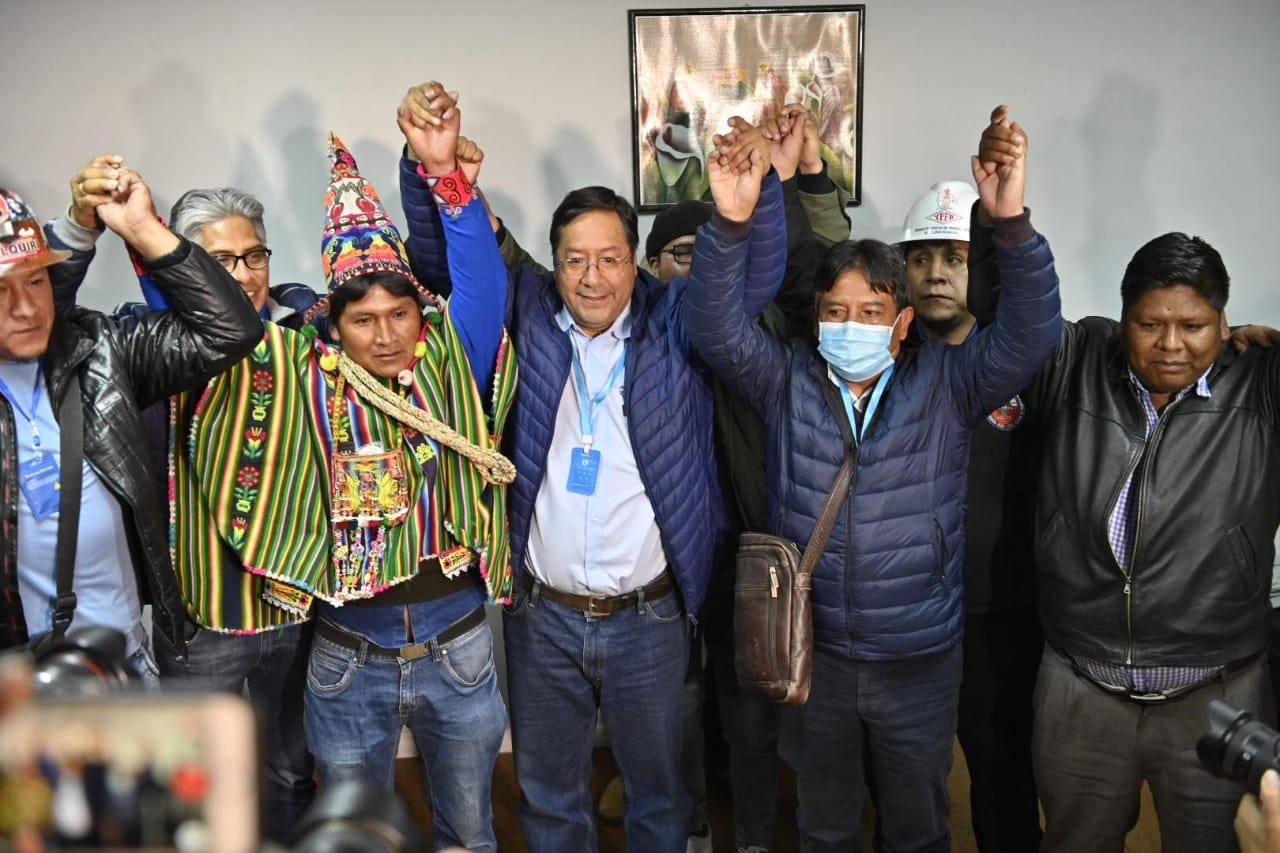Bolivia - Arce’s decisive victory
Bolivia’s new president-elect must use his big win in yesterday’s election to move the country forward

Above: Photo from President-elect Arce’s Twitter account
The polls showed Luis Arce leading by about ten points. Instead, he won yesterday’s election by around 20 points. The early count by two polling firms suggests the MAS’s presidential candidate won over 50% of the vote and the MAS will win majorities in the Senate and lower house. The full vote count will take a few days, but these numbers seem fairly definitive.
Positive early signs suggest a lower risk of election violence.
The definitive result rather than an uncertain and controversial one gave an important mandate to the MAS and Arce. It left no room for MAS opponents to contest the election results.
Interim President Añez sent out a tweet congratulating Arce and the MAS. It was an important step after a day full of tension and delays over posting even the interim results.
Arce’s statements upon winning suggest that he wants a national reconciliation, bringing as many of the MAS’s political opponents into negotiations as will join him. After a year in which the MAS were punished and harassed by the interim government, Arce would be smart to set a different tone and work towards national unity.
Arce faces short term challenges from outside and inside his coalition.
Arce needs to get the security forces on his side. Bolivia’s new president cannot fully trust the military and police forces that forced Evo Morales from office. At the same time, he cannot afford to engage in a full overhaul and replacement. This is the most sensitive issue he faces early on. Morales’s private comments about forming an armed militia will not help matters. The international community should be using its influence with Bolivia security forces to make sure they respect the constitution and the will of the Bolivian people in the election. Meanwhile, Arce must temper the demands of the more radical wings of his party.
Arce must decide how he will handle the abuses of the Añez government. There are elements of the MAS and groups in the international community who will want retribution and punishment for the ouster of Evo and the abuses of the interim Añez government. While it may be deserved and impunity brings its own problems, it would be poor politics in the current moment. To govern effectively, the MAS need to demonstrate that they are better than their political opponents and will not make the same mistakes of the interim government. Arce needs to focus on national unity and moving forward, not punishing the problems of the past. If he moves swiftly to target the Añez administration, he will harm the chances at a pact with his opponents and risk his own political stability.
Arce faces a tough balancing act against the influence of Evo. The MAS’s opponents, journalists and the former president himself want to make this election all about Evo. Bolivian voters, on the other hand, appear happy to be moving forward towards a post-Evo future. These results confirm what polling and interviews around the country had already suggested: Arce is more popular than Morales. His results this year appear to have overperformed Morales’s 2019 results by about ten points. Bolivian voters who lean towards the MAS but are tired of Evo want this new leadership.
At the same time, Evo remains incredibly influential among a portion of the MAS base. The former president controls key elements of the political machinery that mobilized voters in favor of Arce. The members of the MAS entering the Congress are divided among Evo loyalists and a group of moderates, but the loyalists appear to have slightly greater numbers.
At the moment, the best analogy from the hemisphere to the Arce-Morales combination in Bolivia may be Duque and Uribe in Colombia. The former president will remain an incredibly influential member of his protoge’s coalition, but he’s still only one part of a larger political environment that the president must balance against other more moderate interests.
Challenges over the coming year: Protecting health, restoring democracy and rebuilding the economy
Even without the questions of how to deal with the military and his two immediate predecessors, governing Bolivia in the middle of a global pandemic and recession is hard enough. Arce must protect the health of the country, restore an economy that was already doing poorly pre-pandemic, and rebuild democracy following a very rough year that included an attempt to steal an election, a coup, an interim government that committed abuses, multiple election delays, and now a transition back to an elected government.
The population needs jobs and the government needs money to boost the economy out of recession. Arce can’t sit back and hope for a commodity boom like the one that benefited Morales early in his time in office. The fiscal and monetary strategies that worked when Arce was minister of economy aren’t going to work in the new post-pandemic world.
The good news for Arce is that he has a mandate from a majority of the Bolivian population. He needs to use that political capital well.
Thanks for reading
If you want to be added to the newsletter distribution list, please enter your email at https://boz.substack.com/ or email me at boz@substack.com and I will add you.


